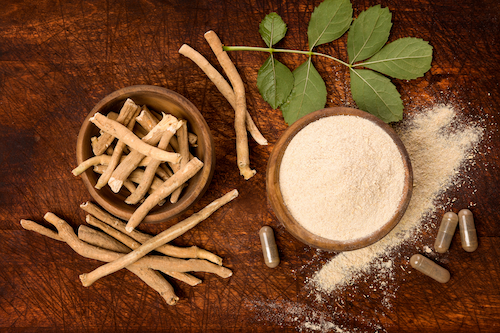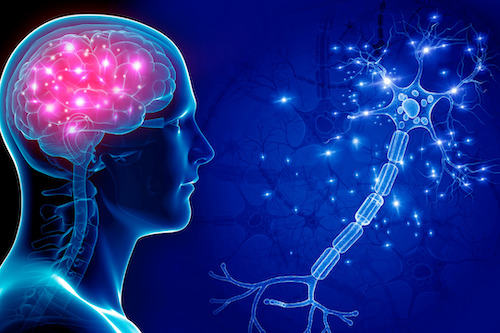Ashwagandha, a Tonic and an Adaptogen, is considered to be nature’s gift to mankind. For centuries, Ayurvedic medicine has used it to treat people for their day to day woes such as stress, anxiety, exhaustion, and lack of sleep. With an abundance of antioxidants, iron and amino acids, it’s no surprise that Ashwagandha is one of the most powerful herbs in Ayurvedic healing. It is classified as a rasayana i.e. rejuvenation in Ayurveda and expected to promote physical and mental health, restore the body and increase longevity. It has been glorified over time for its dual capacity to energise and calm at the same time.
But what exactly is Ashwagandha? The Sanskrit term Ashwagandha translates to “smell of horse”. Traditionally, it is believed that a person who consumes this herbal medicine will gain horse-like strength and vitality. It is a small shrub with yellow flowers and a red fruit, native to India, North Africa, and the Middle East. In the Middle East it is used to help promote normal sleep patterns and encourage a healthy inflammatory response. The extract is typically taken from the berries or roots of the plant and it is also referred to as Withania Somnifera (Latin name), Indian Ginseng or Winter Cherry.
We wanted to include Ashwagandha in our Green Charge to power pack it with incredible benefits! Have a read of some below:
There have been over 200 studies on Ashwagandha benefits, including the herb’s ability to:
- Treat adrenal fatigue
- Reduce anxiety and depression
- Reduce stress
- Improve thyroid function
- Increase stamina and endurance
- Prevent and treat cancer
- Reduce brain cell degeneration
- Stabilise blood sugar
- Lower cholesterol
- Boost immunity
Let’s take a look at some of these in more detail below!

Stress, anxiety and sleep
Cortisol is a stress hormone which is naturally released from the adrenal glands to help the body to mobilise a ‘fight or flight’ response to danger. It normally follows a rhythm called a ‘circadian rhythm’ where it naturally rises in the morning to allow the body to adapt to it’s daily needs before it then lowers in the evening to allow the body to sleep and perform restorative processes.
Ashwagandha has been shown to help promote healthy levels of Cortisol and the healthy inflammatory processes that are stimulated in the response to stress, which in turn promotes healthy function of the immune, cardiovascular, and nervous system along with the brain, muscles and joints. In a 2009 study published in PLOS One, ashwagandha was comparable to common pharmaceutical drugs lorazepam and imipramine, without the side effects. In the 12-week controlled study, 75 participants with anxiety were divided into two groups, one that received naturopathic care and another that received standardized psychotherapy intervention. The naturopathic care group received dietary counselling, deep breathing relaxation techniques, a standard multivitamin and 300 milligrams of ashwagandha twice daily. The psychotherapy intervention group received psychotherapy, deep breathing relaxation techniques and placebo pills twice daily.
When anxiety levels were measured after the 12-week period, the group that received ashwagandha had anxiety scores that decreased by 55 percent, and the psychotherapy group’s scores decreased by 30.5 percent. Significant differences between the two groups were also found in mental health, concentration, social functioning, vitality, fatigue and overall quality of life, with the ashwagandha group displaying greater clinical benefits. In addition to these positive findings, researchers indicated that no serious side effects occurred in either group. A major ashwagandha benefit is that there are no or minimal adverse reactions when taking it. Conversely, antidepressant and anti-anxiety medications may cause drowsiness, insomnia, loss of sexual desire and increased appetite, among other side effects.
Being a powerful adaptogen, it enhances the body’s resilience to stress.
Ashwagandha improves the body’s defense against disease by improving the cell-mediated immunity.”
Improves Depression
Not only does ashwagandha benefit people who deal with anxiety and chronic stress, but it can also be helpful for people who experience signs of depression. The herb improves resistance toward stress, and studies show that it thereby improves people’s self-assessed quality of life.
In a 2000 experimental study involving rats, ashwagandha efficacy was compared to the antidepressant medication imipramine. Researchers found that it exhibited antidepressant effects that were comparable to imipramine when rats were exposed to “behavioral despair” and “learned helplessness” tests.
It was concluded that Ashwagandha can be used as a mood stabiliser in clinical conditions of depression.
How does Ashwagandha support the nervous system?
Ashwagandha supports healthy nervous system function by providing antioxidant support and naturally stimulating the pathways in the brain for GABA (a neurotransmitter that’s responsible for promoting calmness and regulating muscle tone). As well as supporting healthy sleep by regulating natural cortisol rhythm, it also supports a calm and stable mood.

Reproductive health and the endocrine system
By maintaining healthy cortisol levels in the body, Ashwagandha can play a role in reproduction. In the endocrine system, the body produces cortisol from the same precursors used to make reproductive hormones, and under stress the body will preferably produce cortisol instead of testosterone, estrogen and progesterone. When healthy cortisol levels are maintained, resources can be freed up to be used for reproductive hormones.
In men, Ashwagandha has also been shown to support a healthy stress response, healthy sperm levels and normal levels of testosterone.
Balances Blood Sugar Levels
Ashwagandha has been evaluated for its anti-diabetic effects, which are possible because of the presence of phenolic compounds, including flavonoids. Research shows that flavonoids possess hypoglycemic activities, and a study involving rodents concluded that both ashwagandha root and leaf extracts helped achieve normal blood sugar levels in diabetic rats.
An animal study published in Reports of Biochemistry and Molecular Biology found that when ashwagandha was given to fructose-fed rats, it inhibited the fructose-induced increases in glucose, insulin resistance and inflammation. This data suggests that ashwagandha extract may be helpful in improving insulin sensitivity and reducing inflammatory markers in humans.
Helps Fight Cancer
Research suggests that ashwagandha has promising anti-tumor effects, can help reduce tumor cell growth and may work to prevent cancer cells from growing.
The extract has been shown to help inhibit the proliferation of cancer cells — specifically breast, lung, stomach and colon cancer cells, which are among the leading types of cancers in the world. It’s believed that ashwagandha helps prevent the growth of cancer cells mostly due to its immune-boosting and antioxidant abilities.
In addition to the anti-cancer ashwagandha benefits that have been displayed in multiple studies, researchers also suggest that the herb can help reduce the side effects of anti-cancer agents that can reduce immunity and quality of life. According to an overview published in the African Journal of Traditional, Complementary and Alternative Medicines, ashwagandha acts as an immunomodulator that can enhance the life span of cancer patients, who are especially at risk of lowered immunity.
An animal study published in the Journal of Ethnopharmacology found that supplementing with ashwagandha was correlated with an increase in white blood cells within the body. This indicates that the immune system is better able to protect the body from disease and harmful invaders when using this herb.
The decreased count of white blood cells in the body after chemotherapy is a major concern because it puts cancer patients at a much higher risk of health issues, like contracting an infection. This is why this herb may serve as a complementary addition to conventional cancer treatments.
Reduces Brain Cell Degeneration and Improves Memory
Emotional, physical and chemical stress can have damaging effects to the brain and nervous system. Recent research shows that ashwagandha is more than a stress reliever — it also protects the brain from cell degeneration, which can lead to neurodegenerative diseases like Alzheimer’s and Parkinson’s.
One of the main reasons it is so effective at healing the brain is because it contains powerful antioxidants that destroy the free radicals that cause aging.

Boosts Immune Function
Because ashwagandha works as an adaptogen that can reduce the body’s stress hormones, it can help boost your immune system and reduce inflammation within the body. Animal and laboratory research shows that it can enhance immune function by increasing immunoglobulin production.
It is also able to promote an anti-inflammatory environment by suppressing pro-inflammatory cytokines. By downregulating the immune system when it’s compromised, this adaptogenic herb might be a useful tool in the treatment of various inflammatory disorders.
Helps Increase Muscle Strength
Perhaps a surprising ashwagandha benefit is its ability to increase muscle mass and strength. For this reason, it might be a helpful tool for people engaging in resistance training and other forms of exercise that can be strenuous on your muscles.
A 2015 study published in the Journal of the International Society of Sports Nutrition found that ashwagandha supplementation was associated with significant increases in muscle mass and strength. The eight-week study involved 57 males between the ages of 18 and 50 with little experience in resistance training. The men in the treatment group consumed 300 milligrams of ashwagandha root extract twice daily, and the control group consumed starch placebos.
Researchers found that the treatment group had significantly greater increases in muscle strength on the bench-press and leg-extension exercises. Those receiving ashwagandha also displayed significantly greater muscle size increase of the arms and chest, a significantly greater reduction of exercise-induced muscle damage, increased testosterone levels, and greater decrease in body fat percentage.
Even with increased muscle mass, your joints must be strong to operate at peak performance levels. Ashwagandha appears to help with that, too.
In human studies, C-reactive protein (a systemic marker for the body’s inflammatory response) levels were studied and found that ashwagandha naturally mitigated the levels of C-reactive protein which in turn can have an effect on the reduction of occasional joint pain, stiffness, swelling and discomfort in healthy men and women.
Clinical trials studying general joint pain and joint pain related to rheumatoid arthritis have found extremely positive results, with the herb relieving major pain and causing no documented side effects.
Improves Underactive Thyroid Function
One of the most incredible aspects of adaptogen herbs is that they help people with thyroid problems. Ashwagandha has been shown to support a sluggish thyroid for people diagnosed with Hashimoto’s disease, or underactive thyroid.
For the millions of people who struggle with thyroid problems, many of whom don’t even know it, it may serve as the solution they’ve been waiting for. These ashwagandha health benefits for the thyroid also account for the herb’s benefits for weight loss since thyroid issues can lead to weight fluctuations.
A 2017 pilot study published in the Journal of Alternative and Complementary Medicine, ashwagandha benefits for helping patients with subclinical hypothyroidism were evaluated. The 50 participants were diagnosed with thyroid disorder but didn’t display obvious symptoms of thyroid deficiency.
During an eight-week period, the treatment group received 600 milligrams of ashwagandha root extract daily, and the control group received starch as the placebo. Researchers found that the extract improved serum thyroid stimulating hormone (TSH) and thyroxine (T4) levels significantly compared to placebo.
It was concluded that the herb may be beneficial for normalising thyroid levels in patients with hypothyroidism.
Another study published in the Journal of Ayurveda and Integrative Medicine also found that ashwagandha has thyroid-enhancing properties. In the study, patients with bipolar disorder used the herb to improve cognitive function for an eight-week period.
Lab testing found that some of these patients experienced T4 increases during the treatment period, although that was not the original purpose of the study. Research suggests that, since ashwagandha increases thyroid function, it may not be suitable for people with hyperactive thyroid, such as those with Graves’ disease.
Relieves Adrenal Fatigue
Research shows that ashwagandha may be useful in supporting adrenal function and helping overcome adrenal fatigue. Your adrenals are endocrine glands that are responsible for releasing hormones, specifically cortisol and adrenaline, in response to stress.
If your adrenals are overtaxed due to an overabundance of emotional, physical or mental stress, this can lead to a condition referred to as adrenal fatigue. When your adrenals become exhausted, this can also disrupt other hormones in your body, including progesterone, which can cause infertility and lower levels of DHEA, a hormone that’s tied to longevity and maintaining a strong body.
REFERENCES
African Journal of Traditional, Complementary & Alternative Medicines
Andrade, Chittaranjan, Aswath A, et al. Indian Journal of Psychiatry, 2000, 42 (3), 295-301.
Auddy, Biswajit, et al. J Am Nutraceutical Assoc1 (2008): 43-49
Chandrasekhar K, Kapoor J, & Anishetty S. Indian J Psychol Med, 2012 Jul-Sep; 34 (3): 255-262.
Mahdi AA, Shukla KK, Ahmad MK et al. Evidence-based Complementary and Alternative Medicine Volume 2011, article ID576962, 9 pages. Doi: 10.1093/ecam/nep138.
Mishra, Lakshmi-Chandra, Betsy B. Singh, and Simon Dagenais. “Scientific basis for the therapeutic use of Withania somnifera (Ashwagandha): a review.” Alternative Medicine Review4 (2000): 334-346.
Ramakath GSH, Kumar CU, Kishan PV, & Usharani P. J Ayurveda Integr Med. 2016 Jul-Sep; 7(3): 151-157.
Raut, Ashwinikumar, et al. “Exploratory study to evaluate tolerability, safety, and activity of Ashwagandha (Withania somnifera) in healthy volunteers.” Journal of Ayurveda and Integrative Medicine3 (2012): 111.
Wankhede S, Langade D, Joshi K, Sinha SR, Bhattacharyya S. Examining the effect of Withania somnifera supplementation on muscle strength and recovery: a randomized controlled trial. J Int Soc Sports Nutr. November 25, 2015;12:43. doi: 10.1186/s12970-015-0104-9.
Winston, David and Maimes, Steven. “Adaptogens: Herbs for Strength, Stamina, and Stress Relief,” Herbal Therapeutics. Rochester, Vt: 2007.
